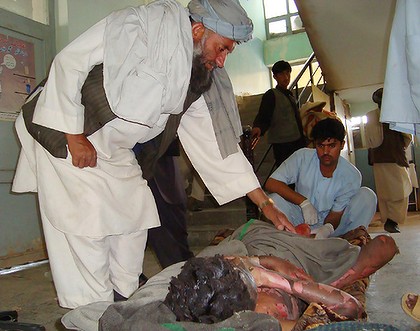"Karzai orders US special forces out of Afghan province"I've known folks who sincerely support some, ah, colorful views. Depending on what assumptions the individual makes, I might expect reactions like these to the Afghan president's decision:
BBC News (February 24, 2013)
"The Afghan president has ordered US special forces to leave Wardak province within two weeks over allegations of disappearances and torture.
"The measures were being taken due to the actions of Afghans considered to be part of US special forces, said a spokesman for Hamid Karzai.
"The strategically significant, central province of Wardak has been the recent focus of counter-insurgency operations...."
How dare they! Don't those foreigners know that America is always right?!
It's a CIA plot.
No doubt this is yet one more manifestation of the rampant cultural insensitivity typical of the authoritarian, male-dominated, all-white American power structure.
I think there's a bit of truth to each of those caricatured attitudes: a tiny bit.
Quotations and Conspiracies
Taking those over-simplified assumptions in order:How dare they!
I'm an American citizen, and know that America is not perfect. Being immersed in the daily blunders and brilliance of this country, we're in a better position to appreciate this than folks living elsewhere. I am convinced that America isn't the cause of the world's problems, either.
It's a CIA plot.
Not everything is a CIA plot. I like good conspiracy theories: in fiction. Assuming that unpleasantness is the result of conspiracies seems dubious, at best. In my youth, a remarkable number of Americans seemed convinced that commie plots were behind everything they didn't like. I get the impression that seeing CIA plots behind every door is more fashionable now, but it's the same attitude.
No doubt....
Like the fellow said:
"A fanatic is one who can't change his mind and won't change the subject."Some folks didn't like shortcomings and outright injustices in the way American society worked, 50 years ago. I was one of them.
Sir Winston Churchill, British politician (1874 - 1965), via The Quotations Page
America has changed quite a bit in the last half-century. Some of it I think was long-overdue, some was not good. But America has changed. Some folks don't seem to have gotten the memo.
Individuals and Responsibility
"...In a hastily convened news conference, the presidential spokesman said US special forces would have to leave Wardak within the next two weeks.I think what presidential spokesperson Aimal Faizi said is important: the issue is what some individuals did. These individuals seem to be Afghan citizens who were working with U.S. special forces. They may have been acting on orders, or they may have been acting as individuals. Either way, what their actions can be seen as being the responsibility of U.S. special forces, and NATO.
" 'There are some individuals, some Afghans, who are working within these cells, within these [US] special forces groups' in Wardak province, said spokesman Aimal Faizi.
" 'But they are part of US special forces according to our sources and according to our local officials working in the province,' he said.
"These Afghan units are facing allegations of involvement torture and disappearances, says the BBC's Karen Allen in Kabul. A preliminary investigation also blamed them for beheading a university student in the province.
"Wardak is seen as a gateway for the Taliban to target Kabul, our correspondent adds...."
(BBC News)
I'm not happy about that. At all.
Based on previous events, I'm inclined to believe the BBC's paraphrase of a United States spokesman: that we take "all allegations of misconduct seriously." I've posted about that before.
Politics
Some details, like beheading someone, seem more consistent with cultural norms of the region than American foreign policy: but I can hardly expect the Afghan president to acknowledge that, under the circumstances.I also sympathize with Mr. Karzai, to an extent:
"...Mr Karzai gave a blunt statement for the reasons for the ban.I grieve for the families who lost children. On the other hand, I hope that Mr. Karzai and others will remember that the folks trying to overthrow his government seem to enjoy using human shields; and that American weapons technology, like this country, is not perfect.
" 'Our forces ask for air support from foreigners and children get killed in an air strike,' he said."
(BBC News)
Related posts:
- Afghanistan
- "War is Not Nice"
(February 15, 2010) - "Afghanistan: Diplomacy, Dialog, Cultural Sensitivity, and 4,000 Marines"
(February 12, 2010) - "Stephen Farrell's Rescue: 'It's Not Fair!' and Assumptions of Omnipotence"
(September 10, 2009) - "NATO, America, Afghanistan, Common Sense and Congress"
(September 5, 2009) - "Afghan Election: A Few Observations"
(August 20, 2009)
- "War is Not Nice"
- America
- "Guatemala, Dr. John Cutler, Tuskegee, Nürnberg, and Learning"
(October 2, 2010) - "A Chilly Cell, the AP, the CIA, and Emotions"
(March 28, 2010) - "Abu Ghraib: Abuse and Sexual Humiliation by American Soldiers in the News Again"
(January 25, 2009) - "America, Racism, and What Didn't Happen at Virginia Tech"
(January 22, 2009) - "Army Report: Big Mistakes in Iraq!"
(June 30, 2008)
Particularly
- "Guatemala, Dr. John Cutler, Tuskegee, Nürnberg, and Learning"

